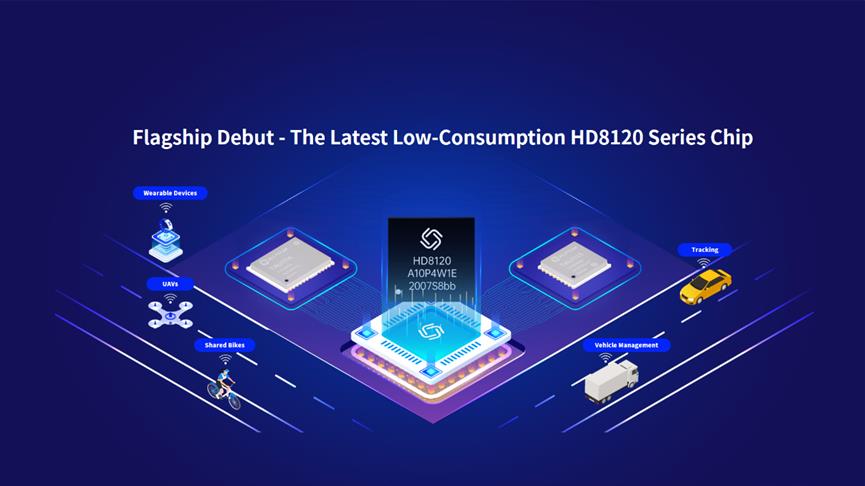Flagship Debut: The Latest Low-Consumption HD8120 Series Chip
On August 25, Allystar launched its latest low-consumption premium HD8120 series chips as well as its derivative modules: TAU1113 and TAU1114. Based on the CYNOSURE III Lite architecture that is optimized in power-consumption and positioning performance, HD8120 improves positioning functionality and rate by robust algorithms, and provides longer endurance for a variety of navigation and positioning applications, especially in those requiring low consumption, such as wearable devices, shared bikes, unmanned aerial vehicles (UAVs), vehicle management, and other fields.

Achieve stable and efficient positioning worldwide
HD8120 series, the single-chip GNSS SoC and its derivative modules support GPS, BDS, Galileo, GLONASS, QZSS, and SBAS signals, and support GPS and BDS joint positioning. They can concurrently receive up to three satellite systems - GPS, Galileo, and BDS or GLONASS, to meet the navigation and positioning requirements such as location awareness, logistics and transportation in the consumer market.
With smart jammer detection and suppression, the HD8120 series is capable of eliminating complex signal interference and capturing correct ones even in urban canyons, to realize stable and efficient positioning on a global scale. The field test results demonstrate that the positioning accuracy of HD8120 is better than that of its competitors in various scenarios, and its navigation and positioning rate and efficiency are excellent though under a sheltered or half-sheltered environment.
Low consumption offers extraordinary endurance ability
As a new flagship product with low power consumption, the HD8120 series adopts Allystar’s newly designed CYNOSURE III Lite architecture that upgrades positioning performance and optimizes power consumption. With the advanced intelligent power management design, the power consumption is reduced by half than the previous generation. The chip also supports wide voltage design, and flexibly supports terminal products with diversified voltage.
A-GNSS makes it rapid to wakeup and fast to fix positioning
In terms of quick positioning, HD8120 improves searching and tracking performance and speeds through online and offline A-GNSS (Assisting-GNSS) service, which greatly shortens the time to first fix (cold start time is shortened to 3-10 seconds). It also enhances the positioning sensitivity, which makes it possible for quick positioning even in a complex and sheltered environment with poor signal, and increases the number of visible satellites, thus improving the overall positioning performance. Besides, HD8120 stores ephemeris data in a Flash memory to optimize the cold start performance.
Apply to consumer terminals to boost BeiDou development
HD8120 series is cost-effective for its GNSS system reception, quick positioning, and low power consumption in terminal applications such as wearable devices, UAVs, trackers, etc. Relying on its industrial-level positioning, HD8120 performs good positioning accuracy and location effectiveness in a bad GNSS environment.
For wearable devices, its QFN40 5*5 mm package, low power consumption, offline A-GNSS, and wide voltage design can reduce the design constraints on wearable devices in terms of chip size and energy efficiency, and reduce the heat dissipation and charging. It can be widely applied to smart watches, smart badges, student cards, pet positioning and tracking, elderly & disabled pension care, etc., which immensely narrow the limits of large-scale application of BeiDou chips.
For UAVs, the single-band multi-system HD8120 series, with its high sensitivity, high precision, low power consumption, low cost, and small size, makes UAVs lighter and more agile, and is especially suitable for the cruise UAVs for its long endurance, offering a larger cruising range.
For shared bikes, the HD8120 series achieves high-precision positioning in a cost-effective way, helping users to find bikes more conveniently. Combined with electric fence technology based on GNSS, it optimizes users riding and parking management comprehensively, improving user experience tremendously. On top of that, the low power consumption in operating and standby mode has greatly extended the duration of its intelligent locks and injected new vitality into those applications demanding lower power consumption.
Release its derivative modules at the same time
At the same time, Allystar released two modules that are developed based on the HD8120 series chip - TAU1113 and TAU1114, supporting GPS/QZSS, BDS, Galileo, GLONASS, and SBAS at low current consumption. Inheriting from HD8120 series advantages, both are cost-effective and versatile modules that feature SAW, LNA, flash memory as well as an antenna supervisor and can be used with active and passive antennas. The dimensions of TAU1113 and TAU1114 are 10.1*9.7 mm and 12.2*16.0 mm, respectively. The highly integrated compact modules are suitable for GNSS applications with strict cost constraints, such as telematics, navigation, tracking, logistics, vehicle management, etc.
With more than 30 years of IC design experience, Allystar continues to advance in the development of GPS/BDS positioning chips and solutions, including the integrated design of baseband and RF and algorithm research. For different needs of industrial applications, Allystar has planned a complete chip product line focusing on shared bikes, telematics, UAVs, intelligent terminals, high-precision applications, etc., including meter-level HD8120 series chips and modules, submeter-level HD8040 series chips and modules, along with centimeter-level HD9300 series chips and high-precision positioning and orientation modules. With its cutting-edge R&D capability and applications, Allystar is striding forward in making good use of GNSS on the ground.
And now, Allystar is building an open platform for BDS chips, which relies on its independently developed multi-system multi-band high-precision Cynosure III GNSS chips based on the BDS-3 system, researches and develops the core algorithms and applications integration, and lifts restrictions on access to raw data and interfaces. Empowering the industrial chain of enterprises’ algorithms and applications integration R&D, the platform provides hardware and technical support for chip development, helps the secondary exploitation of applications functions, and enhances the comprehensive capability of China chips in an overall way.



